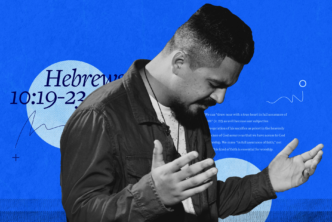This post is by Aubry Smith. It has been excerpted from Moment with God: A Devotional on Every Biblical Book.
After worship one Sunday, I overheard a teenager recounting the latest scandal at her school. Another student reprimanded her, “Don’t gossip, you’re in church!” He certainly ended the conversation, but his words revealed an underlying view by which many Christians compartmentalize life—church is “holy,” everywhere else is “unholy.”
You do not have to read as far in the Old Testament to find Levitical rules about holiness and sacred space. The book is replete with them. God demands holiness from Israel, repeatedly commanding them to “be holy because I am holy” (Lev 11:44, 45; 19:2; 20:7, 26). But how do cleansing rituals for birthing practices and skin sores relate to holiness?
Holiness in Leviticus
In ancient Israel, people, objects and spaces could be judged holy or common. The tabernacle, for example, was sacred because it was God’s dwelling place; therefore, the people of Israel would undergo extensive cleansing rituals before bringing their sacrifices to the priests. God’s command to be holy extended as far as appropriate foods (Lev 11, 17), treatment for infections (Lev 13:1–46) and sexual practices (Lev 18). Something as minor as mold or mildew found on fabric had to be brought to the priest (13:47–59). While these were not matters of moral concern, they were of great spiritual importance. The rituals for approaching God were a means of reminding Israel that God was not common.
The author of Leviticus did not assume that a person could simply follow these rules and be close to God. God established his relationship with his people before placing demands on them. Before Israel heard and obeyed (and disobeyed) the laws given in Leviticus, God repeatedly asserted that he was “the Lord, who brought you up from the land of Egypt to be your God” (Lev 11:45; see also 19:36; 22:33). Israel was established again as God’s people at the exodus, and then they were given guidelines for how they were to live in relationship with him. God even proclaims that he is the one who makes them holy, not adherence to the law (Lev 20:8, 23). So even in Leviticus, God bestows grace to a sinful and undeserving people. The law defines how they must live as God’s people—people set apart, like him.
Jesus changes everything
Jesus changed the rules, though. He entered creation, became the ultimate sacrifice and opened up a way—the only way—for humanity to encounter God. Those with skin diseases came to Jesus for healing and restoration into society. Paul preached that Jesus made all foods and people clean, that circumcision of the heart was the true circumcision. The New Testament bears witness that God makes his people holy through Jesus Christ.
So how do we live as people who have been made holy through Christ? As God’s people, we are given guidelines throughout Scripture for how to treat others, how to use our words, and how to control our thoughts. Yet we do not do this on our own. God’s Spirit now dwells in us—we are his temple (2 Cor 6:16). And he performs this work in us so that we may live as disciples at all times and in all places. Over time, the relationship changes us, and we behave differently. But more important, Jesus transforms us into new creatures who reflect his holiness—no matter where we are.
Get the complete Moment with God devotional
We all have our “God moments” but the intimacy doesn’t always last. Each author in Moment with God captures this beautiful struggle, as they draw on their own stories and the Bible itself. Get the complete devotional for just $9.99.




